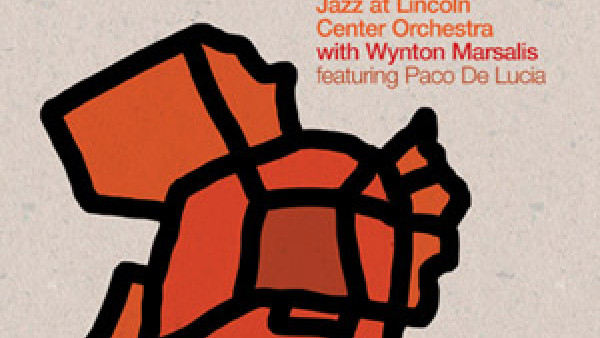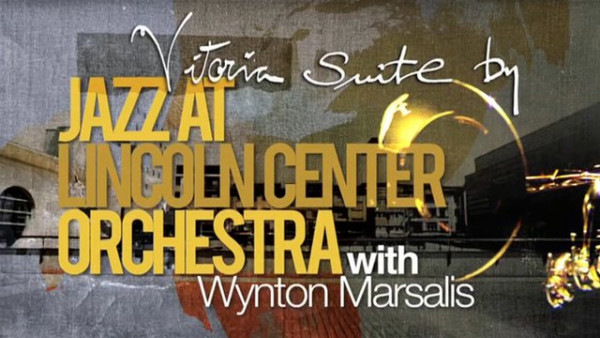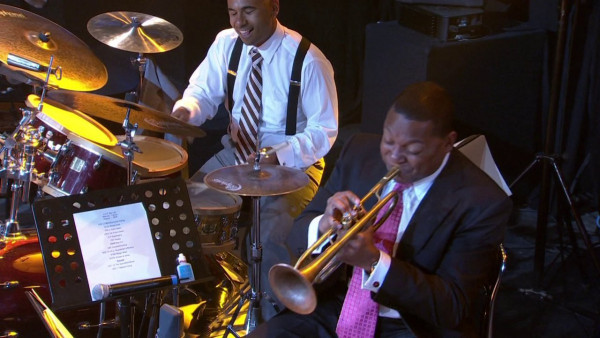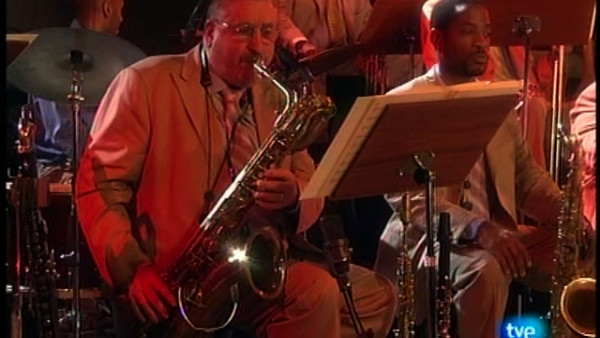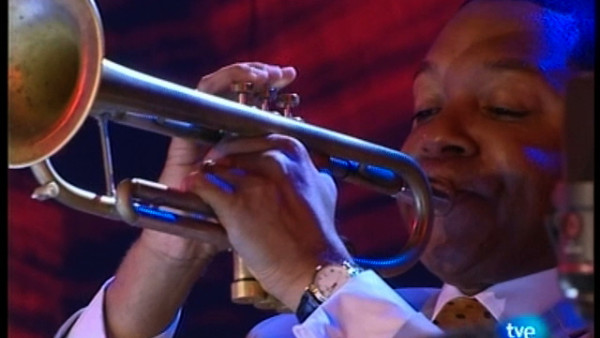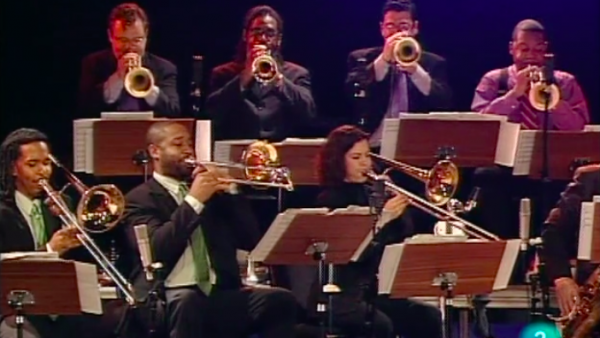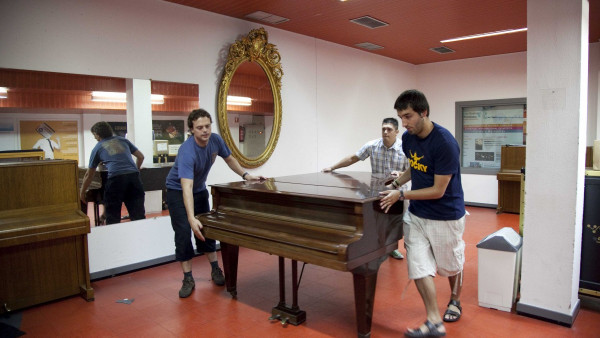BIG 12
It is a week ago from this past Monday morning; we are recording at the Conservatorium de Musica Jesus Guridi in the Aula Magna Isaac Albeniz. Several years ago, I did a big trumpet master class in this same room with about 30 trumpeters of all ages from 6 to 67. The Jedi has been here all last night setting up the space. We are desperate to sound good because we all know this is a golden period for the band, and we want to be documented sounding our best.
I am worried that the room will be too dry (not reverberant enough). In the 1970's, the technology of recording changed to accommodate the newer electronic instruments which sound good going directly to tape (no room sound necessary). The optimal studio became a very dry room so that engineers could conrol the sound electronically without fighting what took place in the room. All ambient sound could be created by artificial echo machines and the like. Tones could be plumped up and everything but soul added by the sound engineer. This innovative step forward gave control over the music to the producers and led to groups recording individual members in separate, isolated spaces relying on headphones to hear each other play. This further liberated us (a few years later) from even having to be in the same studio at the same time when recording. This freedom from the requirements of developing a tone and balancing with other musicians in a room hurt jazz, which places a premium on an individual, nuanced tone and features the struggles and triumphs of musicians communicating and balancing with each other.
One example of this struggle is the drum-bass dynamic. The drums are the loudest instrument, the bass-the softest. The drummer, the most powerful definitive instrument on the bandstand, must fight to play with enough control to allow the acoustic bass to be clearly heard. Just like the power concept in the U.S. Constitution – checks and balances. The bass checks the power of the drummer. Once the bass plugs in, and is as loud as the drums, the drums are free to play as loudly, and a central tension is gone. The characteristics of the music change for the worse. There are many relationships like this in jazz. Get a monitor, and you can play as out of balance as you want (just make the instruments you're drowning out louder in your personal mix, and everything will be ok).
We will be struggling with these issues today because we don't use headphones or anything to impede our hearing. There is a funny saying in the studio, "We'll fix it in the mix." The great Steve Epstein, my producer for many years use to say, "It's not magic. If it sounds good out there (in the room), it sounds good in here. Fix it in the room." We believe in playing in balance and with intensity. That's why we need a good ambient room – to feel good about our balance and general sound.
Well today the room, if anything, is too reverberant.
It's 11am…time to hit. Chano and his men are ready, but no El Piraña. We are ready. The saxophones even had a self- inflicted, three hour section rehearsal yesterday (Sunday), so you know they are chomping at the bit.
Iñaki is ready. This is a dream come true for him as he convinced the city to sponsor this recording. We have never made a record in a studio outside of the U.S., and I am more nervous than usual because I want Iñaki to be happy.
Time to go, and the computers don't work. Down through the years, when stuff doesn't work in the studio, I always feign extreme anger and say, "Two million dollars worth of shit, all kind of college degrees and can't nobody figure out how to turn on a damn microphone." Jedi is 6'7, about 315 pounds…I don't say anything. And I don't want us to lose our concentration over something we can't do anything about. We have six sessions to record a lot of difficult music.
Anyway, El Piraña is not here (he went to Barcelona on the day off). We go outside and start throwing softballs and footballs around…waiting. Two hours pass, an infinity when recording, and the glitch has been fixed. As if on cue, here comes El Piraña as calm as can be (New Orleans musicians are always late too, especially the ones that can play).
We begin. The hall is so reverberant; we have great difficulties hearing each other. Add Chano's men to the mix, and we have a touch of early pandemonium. Ali has anticipated some of these issues. He has learned all of Chano's music from memory because," I don't want to have to look at music and worry about everything else going on." He is crisp and definitive with the cues and groove changes. The drummer is the de facto conductor so his preparation pays immediate dividends. He and Carlos will talk and argue about the tempo and the grooves for the entire session but have a mutual respect and love for each other that fuels the entire band. Slowly we adjust to the room and get "De Cadi" recorded to Chano's satisfaction. Blas sends chills down your spine with his 'deep song' singing, and Piraña is pure root. Tomasito keeps everyone loose. Our ensembles play in two different concepts of time and volume, so there are legitimate challenges for which no one is culpable.
Next, we record the two movements of Vitoria Suite which will feature us, Chano's men and Paco de Lucia. Paco has graciously agreed to play on these movements, and his musical assistant, Javier Limon, is here with a most soulful presence. We do the Bulerías (Paco says it’s really Bulerías por Solea) El Portalòn, so it is.
Normally we play each piece twice and that's it. On rare occasions we have to record more takes. In my experience, we almost always go with the first thing played or maybe the second…never the third or fourth. The first two takes of this piece are too fast and rushing. We decide to do it again at a slower tempo…a drag because at that pace we won't come close to finishing all the pieces.
The hall is hot and stifling. It's summer in Spain, and the air conditioner makes too much noise to be on during takes. It stays off.
Recording the way we do really taxes your concentration, you feel as if you're playing for the ages, and every note or musical choice is extremely important. You perform under the pressure of swing time when improvising under any circumstance. When recording you also perform under the pressure of actual time. Time is very limited, and it is not possible for the whole group to re-concentrate on the same piece 3 or 4 times. It loses its freshness.
The music we are playing with Chano and his men today is so unusual, we maintain our interest and intensity as the day wears on. Tomasito takes off his shirt. He jumps up suddenly and does an impromptu dance at the end of El Portalòn. As we fade out, he mutters some funny phrases ending in "It's ok". He does it at the end of the next take, and cats are disappointed. We hate anything like a routine. Cats tease me for saying the same things about songs in our regular sets. We tell him to do something different, and he obliges with another whole commentary and dance.
The next piece, Deep Blue (from the Foam), goes down relatively easy even though the last section has tricky entrances. Thankfully, Chano changed the groove on this one and made it more playable.
The first day is over and we have recorded 45 minutes of music…on schedule. Iñaki is doing better. The Jedi has a long night ahead of him putting the tracks together and tweaking all the tech problems. He has a local production crew who already love him (they call him ‘Pequeñito’). They are astounded by his encyclopedic knowledge of the technology, his intensity, and his warmth. After tonight they will understand something else – the Jedi’s energy and work ethic is unequaled in the free world. We are bone tired. There are two more days to finish ten movements.
The next day we are very businesslike and efficient. We have adjusted to the peculiarities of the room and Jedi is hitting his stride. I break after every take, and the process seems to be very tedious. I tell cats I think we are being too careful, trying to play everything perfect. Vincent says we are going too slow. The other cats chime in, "Yeah man, let's go." I understand what they are saying and make an immediate adjustment. Cats start jumpin’ all over the music. Vic, Sean, Sherman, Elliot, the Equal Opportunity Rhythm Section…everybody is dealing.
We record six movements in a row, and the day is done. Jedi is happy, Iñaki is even more happy and I am relieved even though I know tomorrow will be a hard day because all three of the pieces have peculiar difficulties. I can't sleep for wondering how my chops will respond to #5 (Blood Cry).
We start the next day with me and the clarinets. I know I have to play this correctly the first or second time. Since I had an operation on my lips 3 years ago, my chops are not the same. Sometimes they feel ok, other times……well. On this piece, I have to bend a lot of high and sustained notes. I can hear Ali and Carlos saying I played better when I had a mustache. The first take – I start off messing up. I didn't stop and played it all the way through to figure out where my chops were. We finish and the sax section looks back at me with an expression that says, "You were joking, right?" Right away we go into what has to be the one. It was. Then Vic says, "We messed up one section. Let's do it again." I say, "Oh, no. That's it for me." Ted says, "That one had the feeling in it." They go over that one part without me, and we go on to the next piece, the hardest of the session…
Big 12
Most jazz musicians act cool and unflustered. We joke all the time, especially in a serious or tight situation. Now, no one says anything. The brass know that the reeds have practiced their parts on the off day, and we also know that we messed up many of these brass pyramids in the concert. It left an unacknowledged bad taste that we are about to wash from our collective mouth. Ali sets the tempo and checks it against a metronome. We start.
Every man is concentrating and determined to let every other man know what he is about in relationship to this hard-ass music. A pure, single-minded sense of purpose engulfs the room and sucks even more air from the space. We try so hard to put an exclamation point on this piece. We start rushing. Ali tries to reign us in by slowing the tempo. We look at each other and he says, "I can't hold them back, man." We are gettin' after it. We adjust to a faster tempo. Then the JLCO shows who and what it is. Ryan Kisor has one unplayable, double high 'A' quarter note on four to complete a brass pyramid. It is played today. Ryan is good luck. He loves to play poker and has the nerves and countenance for it. The brass play two takes of this and miss maybe two or three notes. The reeds are all over their parts. Ali, Carlos and Dan swinging with a willful sharpness. For us, this is the highlight of the session, and we were not bullshitting…at all!
Movement 7 goes down in two takes despite the reed parts in C# which should have been written in Db. Things I never have to worry about: the trombone section (they comes to play); Ali (understands the seriousness of recording); Carlos (policing the groove). The session is over. Dan stays and records his intro. Then, we enjoy relief and satisfaction.
If these posts give you the feeling we are sightseeing, well believe me, that was three days and nights of concentrated work. Whew!
Iñaki is very happy, and so are we. He treats us to one last, excellent repast at the restaurant Sagartoki. "The best tapas in Spain," Iñaki says. We hang for a minute after all the cats have left, enjoying the moment. Iñaki's family is here tonight and so are many of the cats’ wives and girlfriends.
Bags packed and in the truck at 12am. Fernando, Irene and I are in the car at 1am on our way to London…16 hours.
Before we pull off, Iñaki wishes us safe travels. We watch him walk slowly down the desolate, night-lit street, full of emotion. He crosses the avenue, and we feel his contentment with increasing intensity as he fades into the distance. He has taken care of us in the highest style as he has always done. I tell Fernando how much I love and respect Iñaki. Fernando says, "Yeah, that's one bad motherfucker, boy."
Yeah, he is.
Wynton

